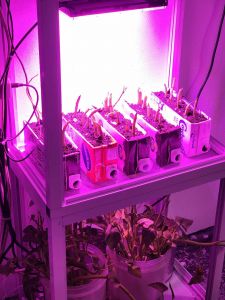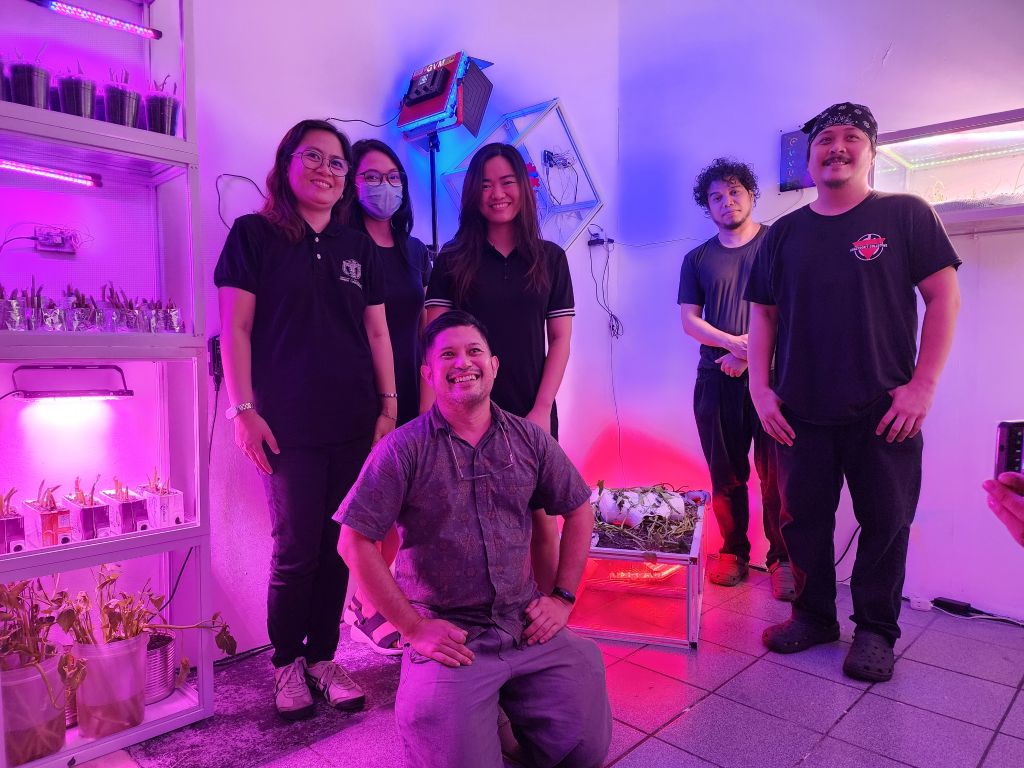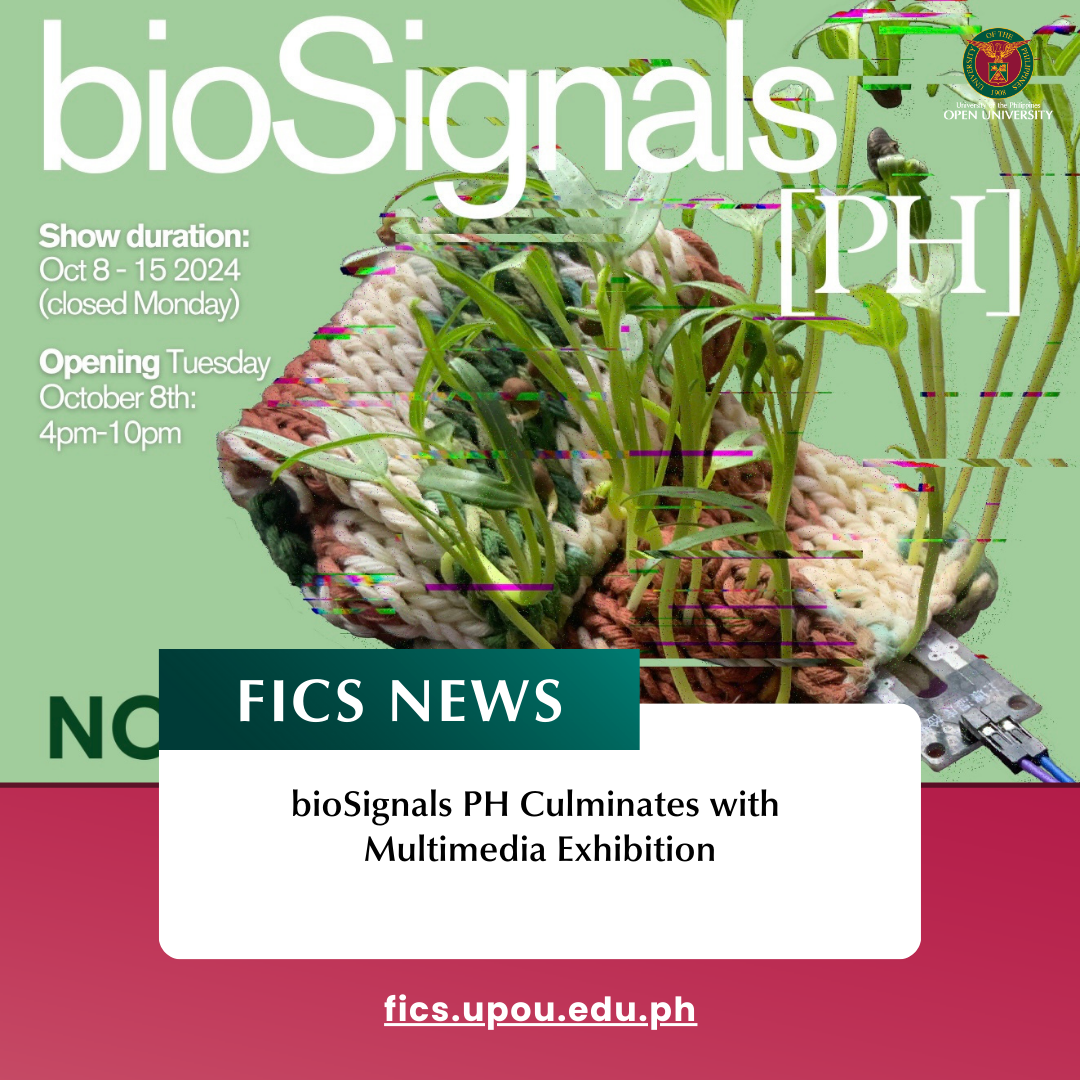
Kangkong (Ipomoea aquatica) plants growing in different planting media using recycled containers.
Plants transmitting biological signals around the world? Come and see for yourself as the bioSignals project culminates with their multimedia exhibit from 8 until 15 October 2024 at NO (@no.communityrunspace) in Diliman, Quezon City. Led by a distributed team of creative collaborators from the University of the Philippines Open University (UPOU) Faculty of Information and Communication Studies (FICS), TERRA BOMBA (Philippines), AwhiWorld (New Zealand), the United Kingdom, and international artscience collective Space Ecologies Art and Design (SEADS), this visionary project focuses on collecting, processing, and transmitting biological signals from live local flora through the use of specialized sensors. By broadcasting this information worldwide, the project aims to foster a dialogue on the importance of connectivity among diverse communities. The exhibit will showcase live plants and sensors that collect real-time data. From there, this information will be shared with partner countries or even sent out into space, contributing to the electromagnetic aura of terrestrial biological activity expanding beyond the planet.
While all three country teams are using the transmission and sharing of plant signals as the creative starting point, the Philippine group has chosen to focus on kangkong (Ipomoea aquatica) as their primary plant subject. This choice is deeply rooted in the sociocultural significance and scientific relevance of kangkong in the Philippines. Kangkong embodies resilience in Filipino culture as it grows readily in various conditions, even in harsh environments, very much like the adaptability of Filipino people. Through an interdisciplinary approach, the Philippine team aims to tell the story of the kangkong based on the collected plant signals, its environmental adaptation, and cultural connotations while highlighting its resilience.
Diego Maranan of FICS coordinated the Philippine team with creative associate Jerome Suplemento , fellow FICS faculty members Blancaflor Arada and Shari Eunice San Pablo, research associate Patricia Calora, and artist Gino Javier of TERRA BOMBA, along with Belgian artist Pieter Steyaert (SEADS).
According to Andrei Nikolai Pamintuan, Head of Arts, British Council in the Philippines, “A huge part of our work at the British Council is bridging borders and fostering meaningful dialogues. Our Connections Through Culture grant proves how the arts are a powerful tool for celebrating and empowering diverse artistic expressions. Our Arts team visited the Biosignals Philippines group as they prepared for their exhibit, and we are in awe of how this collaboration between the UK, the Philippines and New Zealand perfectly captures the intersection of culture, art, science and technology — something that we hope to see and support more to promote cultural exchanges.”

The bioSignals PH team (L-R): Asst. Prof. Blancaflor Arada, Ms. Patricia Calora, Dr. Diego Maranan, Dr. Shari San Pablo, Mr. Jerome Suplemento, and Mr. Gino Javier.
The bioSignals country teams will be engaging the public through events and exhibits happening during the month of October in the Philippines, New Zealand, and the UK. Our project partners will simultaneously stage events at The Strand Arcade (Whangarei, New Zealand) and HartsLane Gallery (London, UK). For more information about the project, visit https://seads.network/project/biosignals.
bioSignals is a creative research project funded by the British Council’s #ConnectionsThroughCulture programme, with additional support in the Philippines from UPOU and the UP President’s Committee for Culture and the Arts, Arts-British Council, and British Council Philippines.
Organisational project members: AwhiWorld, SEADS, and UP Open University.
PH team: Diego Maranan, Jerome Suplemento, Blancaflor Arada, Shari Eunice San Pablo, Gino Javier, Peter Steyaert
NZ team: Maggie Buxton, Kim Newall, Daniel Vandersmissen, Frederico D.A de Sena Pereira, and Jarred Taylor
UK team: Mary Pedicini, Amy Holt, Ulrike Kuchner, Angelo Vermeulen, and Matthew Woodham
Special thanks to Leo Letran, Edilyn Villacora, Jimmy Fermin, Jennifer Pareja, and Earl Magtibay for logistical support and for caring for the plants.

